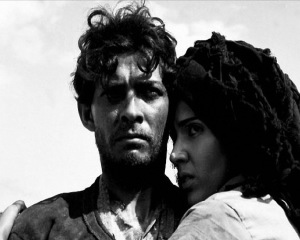
I guess the English title has the benefit of pithiness that the original title (God and the Devil in the Land of Sun) but suggests that the film is about race when it isn’t. The film is about desperation of the dirt poor of the impoverished land the sertão, ‘backlands’ of north eastern Brazil. Cow herder Manuel kills his boss in rage in response to his appalling treatment and so, with his wife, go ‘on the run’. First they join a preacher, Saint Sebastian, who claims he’ll lead them to a ‘promised land’; then a bandit, a sort of low rent Robin Hood (though there’s not much evidence of giving to the poor), Corisco. They are pursued by Antonia das Mortes, employed by the church to kill anyone who threatens the status quo.
I’m afraid that summary makes the narrative seem more coherent than it is. Many of the events are portrayed indirectly, Eisentsteinean montage conveys massacres, but not the way of the Potemkin steps or his later dialectical style; the editing offer an impression of events rather than any political argument. Music, vital in Brazilian culture, structures much of the narrative; a mix of ballads, telling of the events of the film, and Villa-Lobos.
What’s most striking about the film are the compositions where people seem to be randomly standing about but, together, offer a vision of confusion, a land that’s lost its moral compass. The sparseness of the backlands of north eastern Brazil have their bleakness accentuated by the black and white cinematography in the ‘academy’ (4:3) ratio.
Glauber Rocha’s influences are many, not least the French nouvelle vague primarily through co-opting the Gallic attitude of ‘director as author’ rather than through stylistic devices. Like Antoine Doinel, the protagonist finds the sea at the film’s end; the ocean has mythic significance as the ‘saint’ had preached that he would lead the dispossessed to utopia where the ‘land is sea, and sea is land’. As Lucia Nagib puts it:
‘Glauber’s mythic backland-sea formula expresses the harrowing feeling of this utopian country that could have turned out right but was fated not to from the day it was discovered. (Brazil on Screen: Cinema Novo, New Cinema, Utopia, (IB Taurus), p9)
Whilst the French were, initially at least, in love with Hollywood, the Third World filmmakers of Latin America had no love for America as they suffered under US-supported military dictatorships. As Corisco says, directly to camera: ‘The dragon of evil swallows the people to fatten the Republic.’ This emphasis upon the political had its roots in Italian neo realism; and, as noted above, Eistenstein – who worked in Mexico during the 1930s. This link details more of Rocha’s influences and this takes you to his manifesto the aesthetics of hunger’.

This is one of the great classics of Latin American Cinema.
I should say that I think the film both uses techniques found in the Nouvelle Vague – jump cuts for example – and Soviet-style montage, discontinuities like those in the final confrontation seem very dialectical.
I find it an intensely political film – partly in the way that it dramatises class and class-based institutions in opposition to the poor rural proletariat: but also in the use of music, another influence from Soviet Cinema. I found the final long tracking shot incredibly powerful.
LikeLike